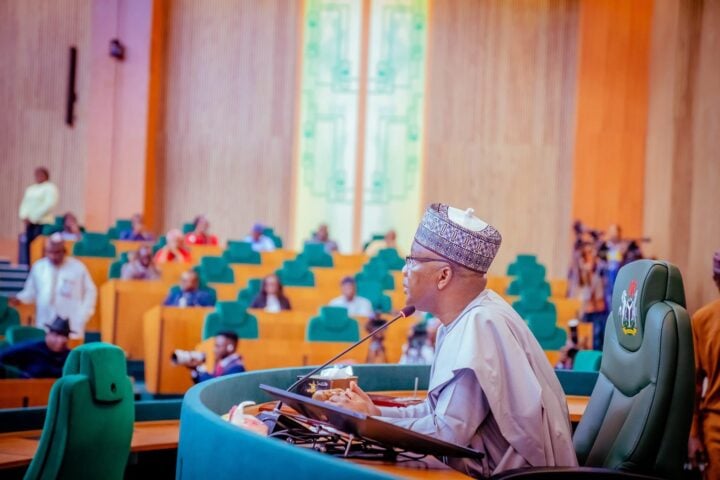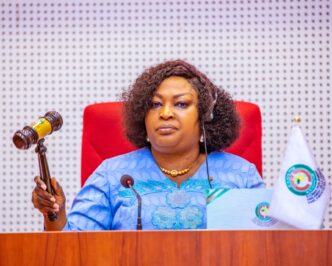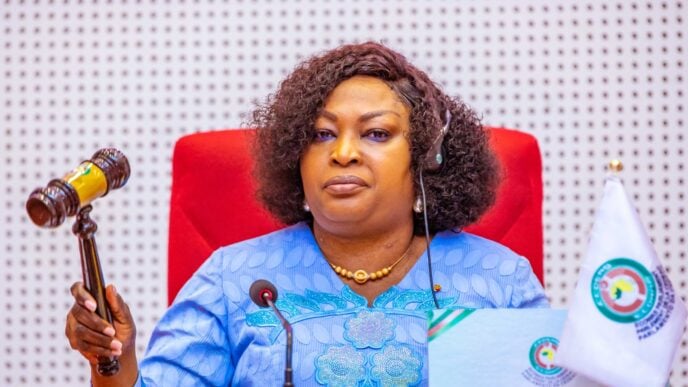Tajudeen Abbas, speaker of the house of representatives
Tajudeen Abbas, speaker of the house of representatives, has received knocks over a bill seeking to punish citizens who refuse to recite the national anthem and pledge.
The proposed legislation, called the ‘Counter Subversion Bill’, is sponsored by the speaker. It was introduced on the floor of the green chamber in July.
According to the bill, Nigerians who refuse to recite the anthem would be liable to 10 years imprisonment, or fined N5 million, or both.
The bill also seeks to punish anyone who professes loyalty to an organisation that disregards the country’s sovereignty — with four years imprisonment or a fine of N3 million.
Advertisement
Nigeria recently reverted to its old anthem following an executive bill.
The proposed legislation has sparked outrage, with Oby Ezekwesili, a former minister, calling it “irrelevant”. She argued that there are more pressing issues confronting the country.
The bill has also been slammed on X, the platform formerly known as Twitter, as a descent into “dictatorship” or “totalitarianism”.
Advertisement
I am certain that the Speaker of the @HouseNGR @Speaker_Abbas @nassnigeria knows this for a fact.
Surely, he must know that the so-called #CounterSubversionBill which he introduced- and alleged to be in its second reading – is a silly flight of fancy that further reveals how…
— Oby Ezekwesili (@obyezeks) August 14, 2024
House of Representatives think they can force patriotism?!
Jokers!
I will rather serve 20 years in prison than sing Tinubu’s anthem that the slavish National Assembly passed https://t.co/13GWt1npwJAdvertisement— Aisha Yesufu (@AishaYesufu) August 14, 2024
A new bill is about to be passed.
If you insult any politician, you get 2 years in prison or 4m fine.
If you refuse to sing the National Anthem, 10 years in prison.
AdvertisementIf you protest, 5 years in prison.
I refuse to believe this is happening in Nigeria. pic.twitter.com/lVQGhH1y7F
Advertisement— Morris Monye (@Morris_Monye) August 13, 2024
Totalitarianism is a political system and a form of government that prohibits dissent opposition, disregards and outlaws the political claims of individual and group opposition to the state, and controls the public sphere and the private sphere of society.@Speaker_Abbas and his… pic.twitter.com/xLddnQ6102
Advertisement— 👁️ (@Ollawaski2) August 14, 2024
The legislators are so disconnected from the people and the #EndBadGovernanceInNigeria never taught them any lessons.
Advertisement— Odogwu Anioma (@jidifeanyi) August 14, 2024
‘BILL WITHIN REALM OF ANTI-TERRORISM NETWORK’
Reacting to the umbrage that has greeted the bill, Musa Krishi, spokesperson of the speaker, said the legislation falls within Nigeria’s anti-terrorism framework.
He said the bill seeks to address subversive activities by associations, organisations, militias, cults, bandits, and other proscribed groups.
“Similar legislation obtains in other climes with varied appellations. Such countries include the United Kingdom, Spain, India, Turkey, Canada, Australia, among others,” the spokesperson said.
“The speaker, and by extension the house of representatives, which is the people’s house, welcome robust engagements and discussions from Nigerians on the contents of the bill, and how best to address the concerns raised.
“By Parliamentary processes and procedures, the Bill would have to be listed for Second Reading, where Members will thoroughly scrutinize its merits and demerits during debate. At this stage, Members can decide to ‘kill’ or allow the Bill to pass.
“But if it scales to second reading, it would be referred to the relevant committee of the House for further legislative action.”
Kirishi said the bill was about national security and does not target any group.
Add a comment










